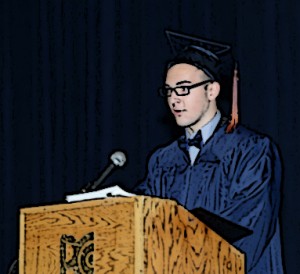
Karen Arnold, a Boston University researcher has conducted a 14 year longitudinal study of high school valedictorians, finding that they rarely achieve fame and fortune. To be sure, they usually finish college, many earn graduate degrees and about half rise to top tier positions.
“But how many of these number-one high-school performers go on to change the world, run the world, or impress the world?” Eric Barker is asking this question in his new book, “Barking Up the Wrong Tree.” He cites another study of 700 American millionaires, finding that their average high school GPA was 2.9. Of course, not all millionaires are game-changers.
Barker seems to believe that there is a disconnect between the kinds of students we reward and the kinds of graduates that a rapidly changing world needs. He suggests two reasons for this incongruity, both of which I touch on in “The Quiet Revolution.”
- “Schools reward students who consistently do what they are told” – and life rewards people who shake things up. Arnold says that in high school, “we are rewarding conformity and the willingness to go along with the system.Speaking to a group at Business Insider’s New York office, Baker said, “In school, rules are very clear. In life, rules are not so clear. So a certain amount of not playing by the rules is advantageous once you get out of a closed system like education.”
- “Schools Reward being a generalist” If you are passionate about political history, you have to restrain that passion for time to spend on your Math, Science, Health, and English homework. The real world rewards passion and expertise.
Surprisingly, Arnold’s study found that students “who genuinely enjoy learning tend to struggle in high school. They find the education system ‘stifling’ because it doesn’t allow them to pursue their passions deeply.”
Lebowitz, S. (2017, May 29). Why valedictorians rarely become rich and famous — and the average millionaire’s college GPA was 2.9. Business Insider. Retrieved from http://www.businessinsider.com/why-high-school-valedictorians-dont-become-really-successful-2017-5

Hi, David! I am just beginning my practice in a high school social studies classroom, and I found your blog as part of a research project for a master’s program at the University of Michigan. First, let me say Wow! There are so many great concepts going on throughout your blog! This one caught my attention because I think it is so critical to encouraging student success. Students far too often get discouraged by the success of their peers in a strictly academic setting like high school, and often this can deter them from striving for loftier goals moving forward.
Do you have any advice on how best to show these students that they too can succeed without
1.) Saying it is ok to not try hard in high school because you can still find success after
or
2.) Making the kids who are succeeding in school feel as though they will not be so successful after they have completed school?
I feel that this is a very important concept to understand when working with students, but there are a number of fine lines teachers must balance. Just curious on your thoughts! Thanks so much!
Brandon
I found the comparison of the two studies at the beginning of this article to be quite eye opening. Many would believe that the top graduating students would go on to create successful futures. And though unfortunate, there is the assumption that failing students will end up struggling to survive in the real world. However, these studies seem to show the opposite. This poses a strong point to consider—students who reach high levels of academic success seem to be the ones who are praised the most, but we view struggling learners as the students we need to change. Instead, we should look to find their particular strengths. Not everyone is going to be a college professor or a doctor or lawyer. In order for our society to thrive, we need graduates who are skilled in the trades. Without mechanics, we could not drive our cars. Without manual laborers, we would not have buildings. My take-away from this article is that we must view each student as an individual and embrace diversity. We must encourage each learner to set goals and grow.
However, one point that I slightly disagree with is the idea that ‘not playing by the rules’ can be advantageous. Though I get the point that the author is trying to make about standing up against conformity and following one’s true passions, I believe that there are set rules in the school setting for a reason—to maintain a safe learning environment. When you think about it, society has rules too. I think that students should learn early on how to follow or ‘play’ by the rules. There are ways to take risks without breaking rules. I believe we can teach our students the value of having a voice, and encourage them to share their opinions while upholding the rules. And though not all students have a passion for Math or English, teaching these subjects helps students become well-rounded and provides them with knowledge that can help them become successful members of our society.